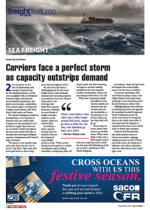Freight rates for December were expected to increase following a heavy blank sailing programme implemented by ocean carriers in November, said Anders Schulze, global head of ocean freight at Flexport."In 2023, the ocean freight industry faced a drop in consumer demand, resulting in reduced volumes and lower rates," he highlighted in a recent webinar discussing the sector's 2024 outlook. Weak demand and growing ship capacity further contributed to widespread, long-term rate reductions.Schulze said in the face of the ongoing economic uncertainty, making predictions presented a formidable challenge. He expects no change between 2023 and 2024, with the prevailing surplus in capacity expected to persist. His outlook is grounded in the anticipation of a modest increase in demand, coupled with the significant order book scheduled for delivery in 2024, representing about 13% of the existing f leet – a notable contrast to the 7% average observed in the 2010s.Lars Jensen, CEO and partner at Vespucci Maritime, said he doubted this would be realised. He acknowledged the sizable order book but was cautious, citing an imminent market downturn. Accounting for slippage and scrapping, he estimated a delivery rate closer to the 8–10% range, emphasising that historical context didn't deem this level of additional capacity growth extreme. "It does, however, not mean that it balances the market. Make no mistake, there is too much capacity coming on board."Jensen said the lack of scrapping of vessels the past two years had been unusual. When examining the order book, he noted a mismatch between incoming ships and those requiring scrapping. While he expected scrapping to increase in 2024, he doubted it would adequately manage the excess capacity.In response to these dynamics, carriers are anticipated to persist with the blank sailing programme initiated in November. Schulze revealed that carriers were contemplating blanking 15 to 20% of planned sailings in 2024, with some weeks seeing up to a third of sailings being blanked. Smaller carriers were also expected to exit competitive markets, and slow steaming was likely to continue. This, in turn, would lead to a tight availability of space on key trade routes in the foreseeable future.According to Jensen, the carriers' actions in the latter half of the year could be characterised as "too little, too late." He pointed out that their increase in blank sailings had occurred only recently, leading to a significant drop in rates throughout the non-existent peak season. Expressing uncertainty about whether the carriers had scaled back capacity adequately, Jensen questioned the effectiveness of their efforts in addressing the challenges faced by the industry.Schulze added that high interest rates were expected to continue, exacerbating the situation, further impeding consumer demand in 2024.

